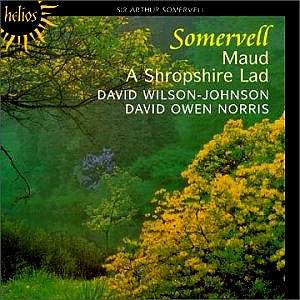The first reason for recommending this CD is the excellent
and informative notes by Stephen Banfield (the distinguished biographer
of Gerald Finzi). In saying this I do not mean by implication to diminish
either the music or the performances. However, Banfieldís notes are
an important starting point for they set these two song cycles in context.
As Prof. Banfield points out, it was not until the
1880s that the solo song recital was introduced to England. Consequently,
Somervellís cycles (he wrote four in all of which these two were the
first and second) were pioneering works in several respects. Not only
were they among the very first cycles to be composed in this country,
they were also among the first examples of narrative cycles in English
and, finally, the Shropshire Lad cycle "comprises the earliest
traceable Housman settings". Thus, in addition to their intrinsic
merits these Somervell settings deserve to be judged as important, pioneering
English compositions.
The earlier of the two cycles here is Maud,
in which Somervell makes his own selection of passages from the 28 poems
which comprise Tennysonís original 1855 monodrama. Somervell constructed
a cycle of 13 songs from this material. Listeners are referred to Stephen
Banfieldís notes for detailed comment on the composerís choice of texts.
The music itself owes much to German romanticism but in this Somervell
was far from alone (influences of Brahms and, especially, Schumann are
evident, for example in many of Stanfordís songs). One cannot get away
from the fact that Somervellís music for this cycle is derivative and
his is not as distinctive a voice as, say, Gurney or Finzi. However,
there is much to enjoy and admire in these songs.
Iím not sure that Somervell quite meets the challenge
posed by some of the more dramatic images in Tennysonís verses but thereís
an appealing, simple dignity to some songs (ĎShe came to the village
churchí or ĎI have led her homeí). Again, the quick waltz tempo and
rippling accompaniment for ĎCome into the garden, Maudí produces a charming
effect.
In the last four songs the mood darkens. Gone is the
youthful ardour with which the narrator wooed the young Maud. The story
has moved on and these final songs deal with enforced parting and death.
Iím not quite sure that Somervellís music can really encompass the intense,
almost neurotic emotion of Tennysonís text here but, if not, it is a
"near miss" and Somervellís cause is advanced nobly here,
as it is throughout the disc, by David Wilson-Johnsonís singing.
A Shropshire Lad comprises ten of A. E. Housmanís
poems. The problem with this cycle for the listener is, I think, greater
familiarity due to the fact that other composers, such as Butterworth,
Vaughan Williams, Gurney and Finzi have subsequently made fine settings
which are more frequently heard nowadays. However, if Somervellís songs
are judged on their own merits, as they should be, they can be enjoyed
greatly.
Housmanís poetry lends itself to strophic setting more
than does Tennysonís. Furthermore, the emotions expressed on the poetry
are more direct. These features may suit Somervellís musical temperament
better, I suspect for in this Housman cycle he adopts what is to my
ears a more fluent and Ďsimpleí style. With hindsight, I suspect that
he was more comfortable with the less heroic and less romantic style
of Housman. Certainly I think these verses suit his muse better.
Several of his chosen poems were later set by other
composers, sometimes memorably. However, two or three of Somervellís
choices were not subsequently set by anyone else, so far as I know,
and these songs are therefore of particular interest. I would commend
especially the deeply eloquent setting of ĎWhite in the moon the long
road liesí.
This cycle is a fine collection of Housman settings
and they deserve not to be overshadowed by the more celebrated and frequently
heard settings by other composers.
Having begun by praising the liner notes I must finish
by being just as enthusiastic about the performances. It is hard to
think that a better case could be made for these songs. David Wilson-Johnson
sings marvellously, responding to all the different moods of the songs.
His is a commanding voice, which suits the heroic songs, but he can
fine down his tone to a lovely, well-spun piano with no loss of intensity.
Always he conveys a palpable sense of line and an involvement which
draws in the listener. Full texts are provided but these are scarcely
necessary since his diction is exemplary (though I think that he does
overdo the rolled "rís" a bit). Throughout, he receives superb
support from David Owen Norris.
The recorded sound is full and clear with the performers
set in a credible acoustic. This reissue is greatly to be welcomed and
should be heard by all lovers of English song. Strongly recommended.
John Quinn


